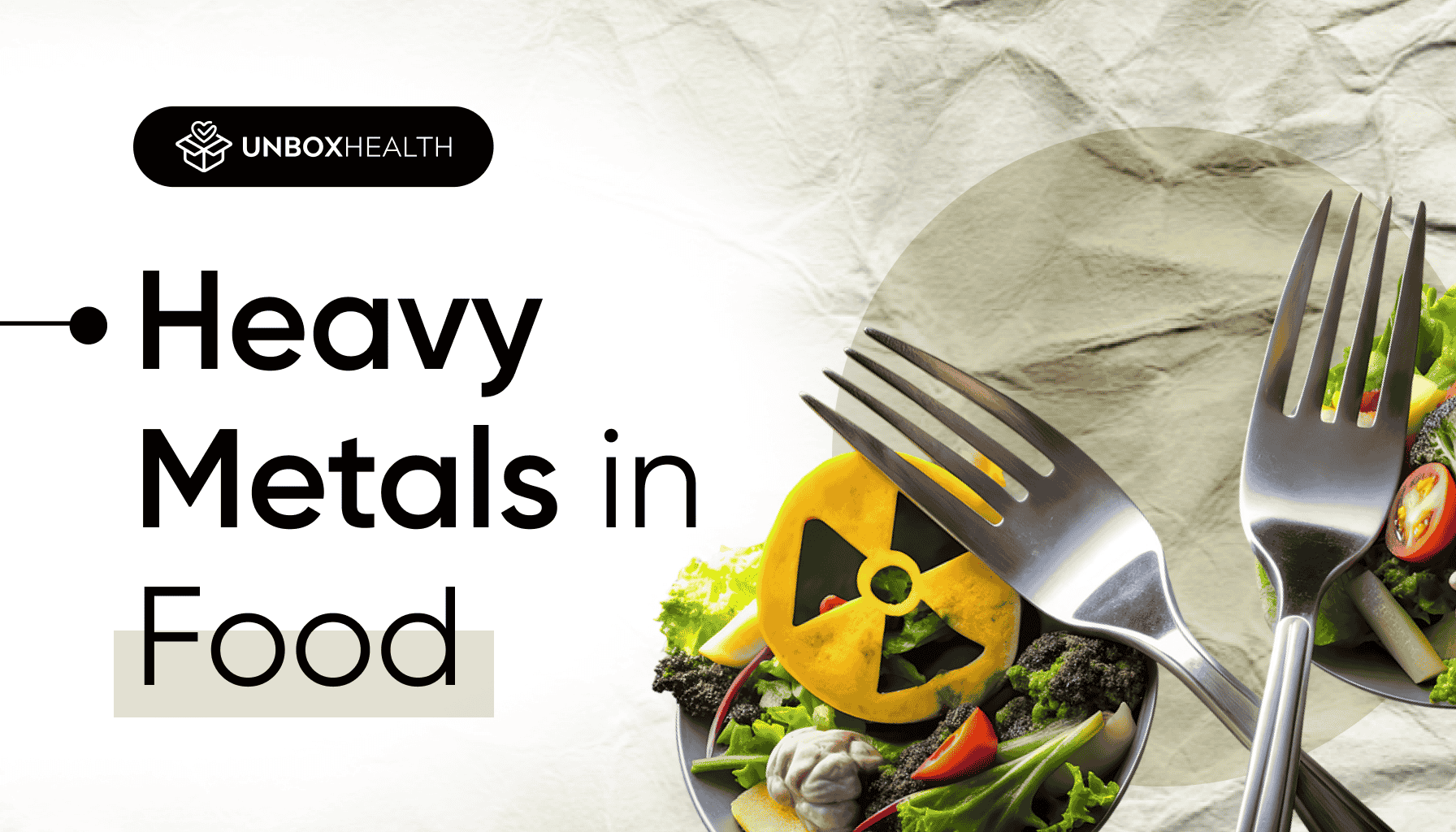Have you ever wondered if your “healthy” food is really safe? Not just sugar levels, fats, or preservatives, but something more invisible and insidious?
We’re talking about heavy metals. Arsenic. Lead. Mercury. Cadmium. You can’t taste them. You can’t smell them. But they may be quietly entering your body through foods you eat every single day – rice, spices, cereals, protein powders, even baby food, and much more.
At Unbox Health, we don’t just rate products based on labels or marketing claims. We test them for real. Using independent third-party labs, we lab-test food products for heavy metal contamination. Why? Because you deserve to know what’s inside your food. Not just what brands want you to believe.
Let’s unpack the truth.
What Are Heavy Metals and Why Should You Worry?
Heavy metals are naturally occurring elements, but at high levels, they can be toxic to your body. The worst part? These metals bioaccumulate, they slowly build up over time, stored in your bones, liver, kidneys, or brain.
Here’s the reality:
- Lead exposure has been linked to cognitive decline, ADHD in children, and hypertension in adults. [1]
- Arsenic in food (especially rice) is associated with increased risk of cancers, heart disease, and developmental issues. [2]
- Cadmium affects kidneys and bones, and can disrupt reproductive health. [3]
- Mercury, mostly in fish, is known to harm the nervous system especially in unborn babies and children. [4]
Now you might be thinking, aren’t there limits? Yes. But many packaged foods don’t disclose these levels, and regulatory limits aren’t always updated for chronic exposure or sensitive groups like children.
Where Do Heavy Metals Hide in Your Everyday Diet?
Brace yourself. Even your everyday “healthy” staples can be culprits:
- Rice & Rice Products: Rice absorbs arsenic from soil and water more than other grains. Brown rice can have even higher levels due to its bran. [5]
- Protein Powders: A 2018 investigation by the Clean Label Project found that many popular plant-based protein powders had detectable levels of lead, cadmium, and arsenic. [6]
- Baby Food: A 2021 U.S. Congressional report revealed that many top baby food brands contained dangerous levels of heavy metals, well above FDA-recommended limits. [7]
- Spices: A 2021 study in Environmental Research found that many Indian spices like turmeric, chili powder, and cumin had high lead content due to contamination during processing or adulteration. [8]
- Dark Chocolate: Even the cleanest-looking artisanal bars can contain cadmium and lead because of where the cocoa is grown. [9]
And the issue is worse in countries like India, where labeling laws are vague, testing is inconsistent, and many local brands go unchecked.
Why It Matters for Your Health and Your Kids
Heavy metal toxicity doesn’t happen overnight. It creeps in slowly, and the symptoms are often vague: fatigue, gut issues, anxiety, hormonal imbalance. In kids, the effects are even more serious: lower IQ, learning disabilities, delayed development. (11)
And here’s the kicker – you won’t find this on the packaging. No brand will ever say, “We found 200 ppb of lead in our turmeric.”
That’s why independent testing matters. And why you should be asking tough questions about what’s inside your “clean” protein powder or spice box.
What You Can Do Now
We’re not here to scare you. We’re here to empower you. Here’s how to protect yourself and your family:
- Check Product Ratings on Unbox Health: Look for products we’ve lab-tested and rated for heavy metal safety.
- Diversify Your Diet: Avoid eating the same grain or protein powder daily. Diversification reduces cumulative exposure.
- Rinse and Cook Smart: Washing rice thoroughly and cooking it in excess water (then draining) can reduce arsenic content by up to 57%. [10]
- Support Brands That Test Transparently: Ask your favorite brands if they test for heavy metals—and make that data public.
- Follow the 80–20 Rule: Eat clean and safe 80% of the time. When you indulge, make it conscious.
Food marketing sells you health. But at Unbox Health, we lab-test it.
We’re not here to make you paranoid. We’re here to make you informed. Because real health starts when you stop looking only at carbs and protein—and start asking: “What’s hiding beneath?”
Check out unbiased lab-tested ratings on Unbox Health along with their detailed lab reports.
About Unbox Health
Unbox Health: India’s First Ratings Platform for Packaged Foods and Health Supplement Tired of biased reviews and never-ending claims? At Unbox Health, every product is tested at multiple premium FSSAI-approved NABL-accredited international labs – 100% independently, transparently, and without any brand involvement.
- 100% Transparency: All lab reports are publicly published.
- Zero Hidden Agendas: Products are market-bought with no brand involvement.
- Accurate Testing: Samples tested at up to 3 premium international labs
- Actionable Ratings: Based on Label Accuracy, Toxicity & Nutritional Profile.
Head over to Unbox Health and let the data guide your consumption choices.
References
- WHO. Lead poisoning and health. https://www.who.int/news-room/fact-sheets/detail/lead-poisoning-and-health
- Naujokas MF et al. The broad scope of health effects from chronic arsenic exposure: update on a worldwide public health problem. Environ Health Perspect. 2013;121(3):295–302.
- Satarug S et al. Cadmium, environmental exposure, and health outcomes. Environ Health Perspect. 2010;118(2):182–190.
- Karagas MR et al. Evidence on the human health effects of low-level methylmercury exposure. Environ Health Perspect. 2012;120(6):799–806.
- Meharg AA, Zhao FJ. Arsenic & rice. Springer Science & Business Media, 2012.
- Clean Label Project. 2018 Protein Powder Study.
- U.S. House of Representatives. Baby Foods Are Tainted with Dangerous Levels of Arsenic, Lead, Cadmium, and Mercury. 2021.
- Ericson B et al. Lead in spices, herbal remedies, and ceremonial powders sampled from home investigations for children with elevated blood lead levels — North Carolina, 2011–2018. MMWR Morb Mortal Wkly Rep. 2020;69(3):87–91.
